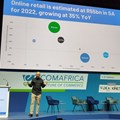Middle East and Africa sees 21% digital commerce growth despite global dip - Salesforce
The data from the latest Salesforce Shopping Index reveals that 2023 was a mixed bag for digital commerce. Global online sales fell 2% year-on-year, but the Middle East and Africa (MEA) saw strong growth in digital commerce at 21% year-on-year.

Source: Getty
Salesforce advises retailers and brands to focus on keeping existing customers loyal rather than on the increasingly costly acquisition of new customers.
Key takeouts from the Shopping Index include the following.
Online shopping visits less profitable
In 2022, consumer loyalty shifted. As prices rose, shoppers chose brands based on product pricing and the value of promotions rather than product availability and fulfilment convenience. Globally, as economic conditions deteriorated, consumers became more price sensitive. They reported that the number one reason they switched brands in 2022 was better pricing.
Additionally, consumers did a lot more research before making a purchase. While online traffic volume grew, online sales and online order volume continued to decline. Why? Consumers went comparison shopping online.
In Q1, global online traffic rose by 6% from a year earlier. That marks five straight quarters of traffic growth despite five consecutive quarters of declining online order volume. When they do buy online, shopping carts are smaller: The number of units sold per transaction decreased by 6% worldwide.
This means every visit to a brand or retail website is becoming less profitable, looking at total online sales divided by total visits. As such, retailers need to develop marketing strategies that utilise intelligent audience segmentation, personalisation and messaging.
Consumer loyalty is improving
The good news is that existing customers are more willing to stick with their preferred brands and retailers if the price is right. The share of online orders coming from repeat buyers in the first quarter rose by 3% over the first quarter of 2022 and 16% over the same time period in 2021. To capitalise on this, leading retailers are pivoting to rewarding loyal customers rather than battling to find new ones.
Salesforce research shows experiences are just as important to consumers as products that retailers sell.
Retailers can start by understanding their loyal shoppers, activating customer data to build personalised experiences, and delivering a frictionless, high-value shopping journey.
Customer service the weakest link
Building loyalty doesn’t end after the sale is complete. The most critical moment in determining long-term customer loyalty is when consumers reach out to your customer service centres.
Salesforce retail data research shows 80% of consumers will switch brands after three bad experiences. Consumers want quick, friendly, and consistent responses, and, more than ever, they are choosing digital engagement like live chat services to get the job done.
Personalised experiences drive customer retention
A sound retail business strategy should mix productivity and efficiency with retention and growth strategies. However, in a time of economic uncertainty, changing internet algorithms, and rapidly evolving consumer behaviours, going back to what you know is critical.
Focus on strategies and programmes that surprise and delight customers, offer added value and more bang for their buck. This is how the European markets are turning things around, and it’s a good bet that it will work in the South African market too, notes Salesforce.

